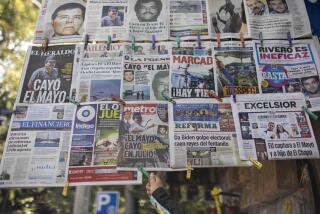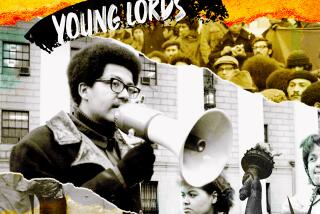Defense lawyers say Mexican drug kingpin Joaquin ‘El Chapo’ Guzman’s health has deteriorated
Reporting from New York — Joaquin Guzman, the drug kingpin known as “El Chapo,” is cold, bored and lonely in his New York prison cell and is rapidly losing his sense of time and perhaps his mind, according to a motion filed Monday by his court-appointed attorneys.
“With erratic air-conditioning, he has often lacked enough warm clothing to avoid shivering… His only opportunity to see daylight is when he passes a small window on his way to exercise or the exercise cell,” according to the motion filed in U.S. District Court in Brooklyn.
“Although he purchased a small clock from the commissary, it was later removed from his cell without explanation. Without a window or access to natural light, the clock was the only way for Mr. Guzman to distinguish between day and night,” it says.
Guzman was extradited from Mexico to the United States on Jan. 19. Since then, he has not been permitted a single telephone call under special administrative measures.
He has pleaded not guilty to charges including drug trafficking, conspiracy and murder.
Guzman is being held in the Metropolitan Correctional Center, a facility sometimes called “the Guantanamo of New York” because of the extreme isolation imposed on its notorious inmates, among them drug lords, terrorists and Mafia captains.
Guzman’s “physical and mental health have deteriorated,’’ the motion says. “He has difficulty breathing and suffers from a sore throat and headaches. He has recently been experiencing auditory hallucinations, complaining of hearing music in his cell even when his radio is turned off.’’
The U.S. government has asked Guzman to retain private counsel because he is a billionaire, according to the documents, but he has been prohibited from speaking to his wife or other family members.
“Logistically it is impossible without communications,’’ said his court-appointed attorney Michelle Gelernt. “Right now, they are stymied.’’
Federal prosecutors have argued that the restrictions are necessary because of Guzman’s history of daring escapes from prison. Prosecutors are also concerned that cartel members could infiltrate Guzman’s legal team, possibly jeopardizing the families of witnesses in Mexico.
The limitations on communications are necessary to prevent Guzman “from committing, soliciting or conspiring to commit additional criminal activity,’’ according to papers filed with the court, and are the “least restrictive that can be tolerated in light of the ... substantial risk that communications or contacts with persons could result in death or serious bodily injury to persons.’’
Among the deprivations, Guzman also apparently misses the media. The motion notes that many books and documentaries are being made about the case, but that he “is prohibited from communicating with the news media and has no ability to contradict negative and false media reports.’’
More to Read
Sign up for Essential California
The most important California stories and recommendations in your inbox every morning.
You may occasionally receive promotional content from the Los Angeles Times.










